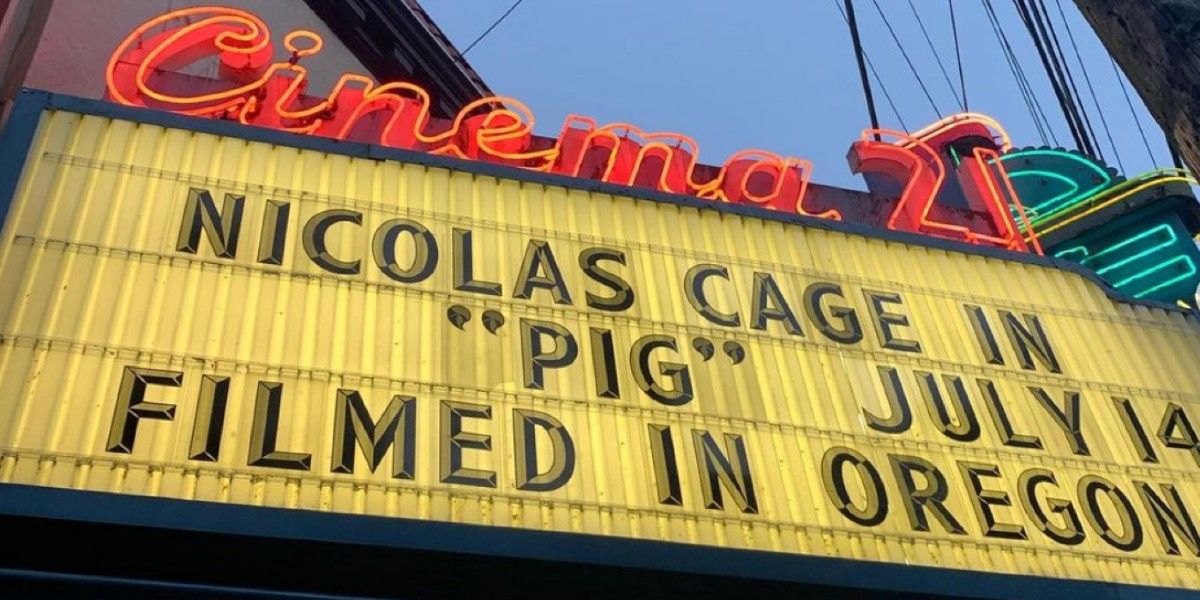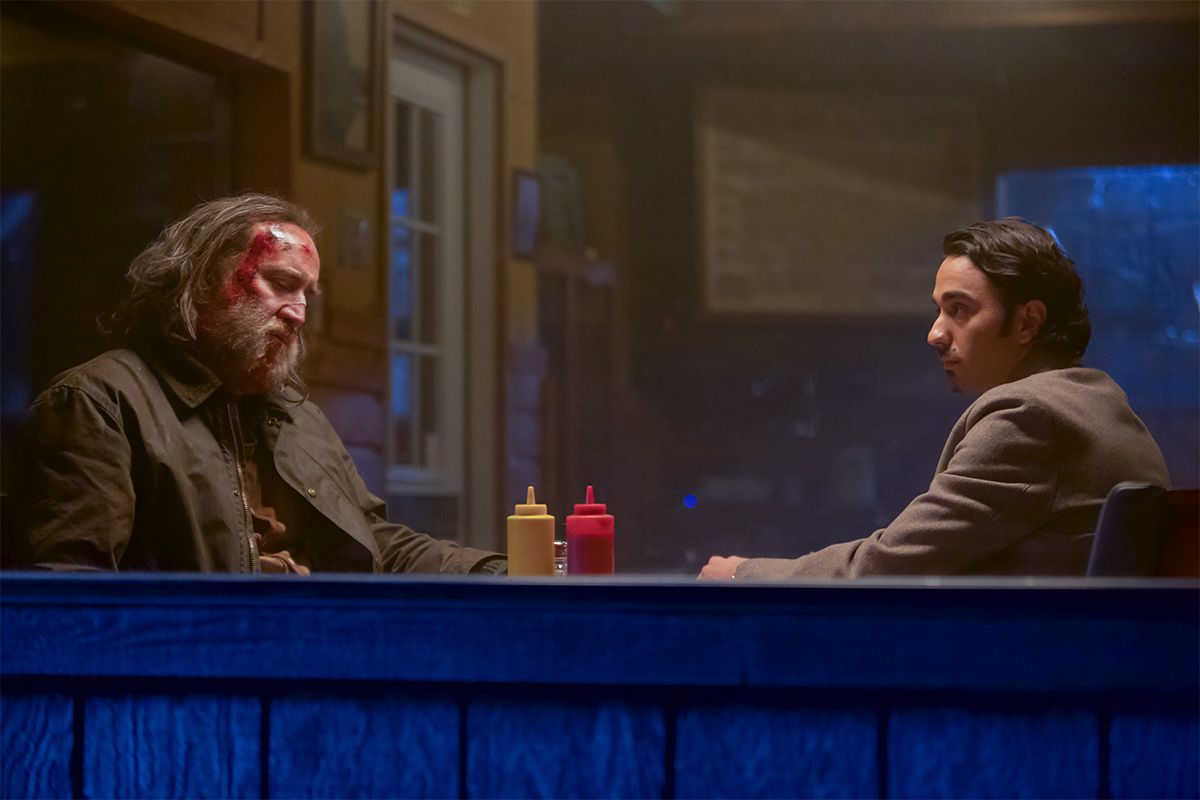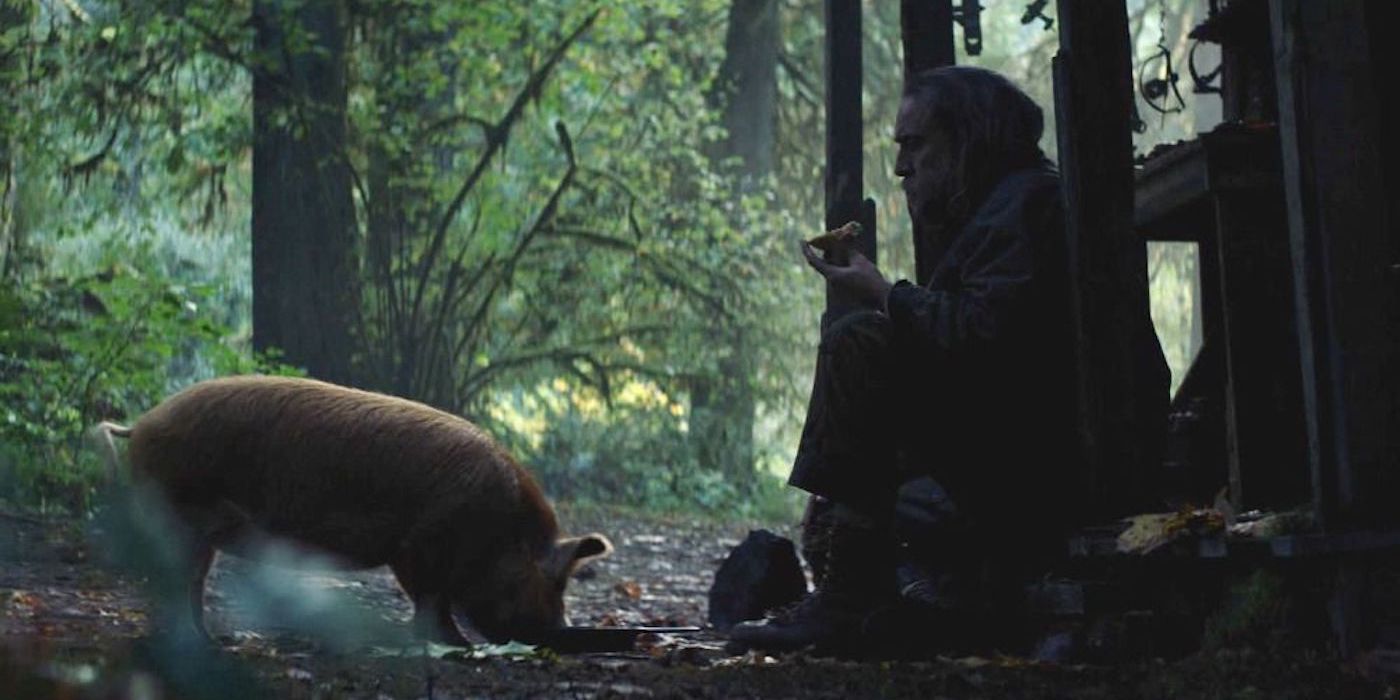A new Nicolas Cage movie opened this past week, which isn't an altogether rare occurrence these days, but Pig isn't just any Nicolas Cage movie. No, this surprisingly tender character study boasts a 98% fresh rating on Rotten Tomatoes, where reviews have declared Cage's performance to be a revelatory return-to-form for the Oscar-winning actor. And while Cage has earned the lion's share of praise from critics, it does, as the saying goes, take a village to make a movie, and the village of Pig was led by writer-director Michael Sarnoski and producer Vanessa Block, who shares story credit with Sarnoski and was one of just two producers on the film to earn the coveted p.g.a. mark.
I've known Block for several years so I've had a front-row seat to her rise as an artist and storyteller. We met through her sister, Jenna Block, an agent at Verve who previously worked as an executive at Escape Artists, and at the time, Vanessa had just returned from making The Testimony, a powerful documentary short about sexual violence in the Congo that was shortlisted for an Oscar and acquired by Netflix. Block directed, shot, and produced The Testimony, which was executive produced and edited by Sarnoski, so Pig was a role reversal of sorts for the two of them, though it only served to strengthen their creative relationship.
Block was once a pre-med student at Yale so she's incredibly smart and articulate, and she did a great job not just in producing Pig under her BlockBox Entertainment banner, but also explaining what the experience meant to her. In doing so, she illuminates Cage's wounded character in the film, shedding additional light on his relationship to both his beloved pet and the outside world they have largely shunned in favor of the Oregonian wilderness.
Neon acquired Pig as a finished film and though it's currently playing only in theaters, it's expected to hit VOD and digital platforms next month before making its way to Hulu under Neon's output deal with the streamer. This is the kind of smaller film that is certainly worth seeking out, so if you haven't seen the trailer yet, be sure to watch it after reading my interview with Block below.
Enjoy... and bon appétit!
I'm not sure Pig is the movie that some folks are expecting, so how would you describe this story to the uninitiated?
Block: On its face, it's definitely a story about a man who lives alone in the Oregonian wilderness with his truffle pig, and when his pig gets taken he has to venture back into the city and his old life to track her down. But I think ultimately -- and this is what was interesting to me about shaping this -- it's much more of a meditation on loss and trauma, and it's really a character study at its core. So I think people going into it expecting 'John Wick with a pig' will be hopefully delighted to see that it's something much more profound and meditative than that.
You and Michael came up with the story for Pig, which he would go on to write and direct, and you would produce, so you are very much the co-creator of this film. How did the two of you first link up and how would you describe your dynamic throughout this experience?
Block: So Michael and I both went to college together, we went to Yale. I was pursuing a degree in chemistry and I was also pre-med, so I was on the track to become a physician, and I hadn't done any work in film, but I had always enjoyed writing screenplays as a kind of side hobby, as a creative outlet. I've always been deeply creative and I felt like I was drowning under the chemistry major's lack of creativity, so for me, film was a love that I had, but something that I enjoyed on the side. So the way we met was, Michael was making a zombie film and I'd heard about it and was really interested in dipping my toes into the waters of making some kind of film at Yale, so we met through the making of that film.
From there, we sort of split ways but maintained a friendship. He came to LA to work on some film projects and I was pursuing medicine. I went on to get my master's degree in global medicine at USC's Keck School of Medicine. It was during that program that I decided that I wanted to make a documentary about this issue of sexual violence in the Congo. I wanted to direct this film that was kind of this marriage between my background in global medicine and the sciences, and my love of film. To me, it felt like the appropriate medium in which to explore this massive issue of sexual violence globally. So I actually reached out to Michael and asked him if it was something that he'd be interested in being a part of, and he ended up being the editor of that documentary and a producer on the film.
And I went off and shot and directed the film and came back, and it was really in the editing process of that documentary that we came to see how additive our skills sets were. There was a really wonderful creative alchemy that existed on that project that was very evident to both of us, and that solidified our desire to continue working together in some capacity. So we went on to develop Pig and a few other projects, and that was the first one that really took off and led us to this moment. But it all had its origins in a zombie film and then a documentary about sexual violence. No consistency there! Two very different projects...
When you and Michael were coming up with this story, did you have an actor in mind?
Block: You know, we didn't, actually. We only had the image of a man sitting on a porch with a shotgun protecting his truffle pig. There was an image that came early on in the process that really informed the idea, which is that apparently truffle hunters -- because their animals are so expensive and so lusted after -- they'll often sit on their porches and protect them with a shotgun. So this image of a man with a shotgun sitting on a porch protecting his pig was really hilarious and kind of endearing to us. So that was the kernel of the idea, and that rapidly evolved into something much deeper, this character study. The point being that we didn't have a specific actor, it was just that image of a man on his porch.
But Nic actually received the script through WME and really responded to the material. He was the first actor we engaged with in a serious way to be in the film, and the moment that he wanted to come on board, it was very clear to us that he had to play this character. Now that we've gotten to the end of this process, I can't imagine anyone else in the role of Rob. It's a very introspective, subtle, quiet character, and there's so much going on internally that it really demands an actor who exists in almost mythic proportions. And Cage may be the only one who exists at that level. He's certainly one of a small handful of people who have achieved that. There's this elusive magic to him, really, and a subtle character like Rob really required that electricity that was just underneath the surface.
So when you found out Nicolas Cage was doing the film, how did you and Michael react? Was there any, like, 'holy shit, we're making a Nic Cage movie!' moment or anything like that?
Block: It's funny, because I didn't really grow up with any of Nic Cage's movies, so I kind of had to educate myself. I mean, obviously, I'd heard of Nic Cage and knew he was a huge star, but I had only really seen Raising Arizona, because I grew up in a family that was very strict about the content we were allowed to watch, so all of the films I was exposed to growing up were pretty much pre-1960s films from before the sexual revolution, so a lot of good old wholesome, black-and-white movies, and not a lot of more modern stuff.
So I hadn't seen a lot of his work, but I was obviously thrilled that someone of his stature wanted to be involved in this small film. I just don't think I fully understood the gravity and the breadth and scope of his career until I really educated myself and watched a lot of his stuff. But I think that any preconceived notions one might have had going into a situation like that, he very quickly made everyone involved in the film feel very comfortable.
I mean, he is larger than life in so many ways but there's something very grounded and deeply intuitive about him, something that really mirrored Rob as a character. There's this sort of silent thoughtfulness and intuition about him as a man, and then that extends to his acting.
This isn't the Nicolas Cage that audiences have come to expect over the last few years of his career, as Pig often plays like an anti-revenge film. Do you think audiences will be surprised by his understated performance here?
Block: You know, it's funny because people are talking a lot about what a surprise this is, and I think people have forgotten the breadth of his filmography. He's done so many quiet, deeply character-driven films, so I think this is just one more wonderful performance in a long line of things that weren't necessarily action-driven. I think what people are going to be surprised by is that this particular film subverts its genre expectation so his performance follows that subversion. But just purely as an actor, we've seen him take on dramatic roles with a lot of heft in the past and this is another one of those.
Do you feel like Pig benefitted from having a woman's touch? In a way, this is a very unique love story, and I'm curious if that's how you thought of it.
Block: I want to answer this really thoughtfully because that's a subject that I'm so sensitive to and think is so important. It's the most thoughtful question I've been asked throughout this whole process.
It's interesting because, on its face, it's a very masculine film in the sense that all of the leads are men, most of the actors are male and obviously, we had a male writer-director, plus many of our keys were male, so it was interesting to find myself in the midst of something that on its face was very quote-unquote "masculine." But you're astute to point out that kind of underlying all of that is this ghost of the feminine, which is his wife, who is since deceased, and who we hear on the tape, and the love that he has for her has changed into the love and companionship he has with this pig, who he refers to with a pronoun that indicates that she's female. So while it has the more superficial elements of something that feels very male-driven, I do think there's this underlying feminine energy to the film, and it also finds its expression through the sensitivity of the cinematography, the lack of violence, and the beauty of the score, which at times has lyrical elements to it. It's very understated, very soft, very poetic, I think, and I have to give credit to our composers, Alexi Grapsas and Philip Klein, and to Pat Scola, who really did an exceptional job with the cinematography. They're all deeply talented.
It's a very insightful question, and the film that comes to mind when you asked this is Lynne Ramsey's You Were Never Really Here because on its face it's a more masculine feeling genre film, but because of her feminine touch and the lens through which she looks at PTSD, it ends up taking on a much more meditative, internal quality. So I think there's definitely something to be said about having women tell stories in spaces that have traditionally been occupied by men. I think it creates a very interesting alchemy that we don't often get a chance to see and I hope that my involvement in the film brought a degree of that to this. How exactly it did that, filmmaking is such a magical, elusive process that I can't articulate specifically how my feminine energy translated to that feeling in the film but I believe it's there and that it's in the DNA of the project.
You mentioned Pat Scola before, and he'd previously shot Southside With You and Monsters and Men, but how did he find his way up to Portland for Pig?
Block: Pat was one of many DPs that were sent to us on an initial list from ICM, reels that we narrowed down based on looks and vibes that we thought were interesting and right for this project, and he was one. He was actually the first meeting we had with any DP and in that meeting he blew us away because he described the pig-napping sequence as a "oner' in the exact same visual language that Michael and I had already decided that we wanted to shoot that scene, so it kind of knocked us off our feet a little bit that we were entirely on the same page, unprompted.
And then just looking at the body of his work, he had proven himself on low-budget films and had this very unique ability to express naturalism through visual language, but he also had a knack for this heightened reality, so it was this ability to capture both the quotidian and also the magical, which is really kind of representative of what Pig is. It's this marriage between those two things. It's a small story and it's a mythic story at the same time, and his visual language and style really reflected an ability to tap into both those things. So that's how we found Pat.
And then we have to just give credit to the place because Portland is an unbelievable tapestry of color and texture and form. It's really a visually arresting place, the forests there are some of the most beautiful I've ever seen in the world, so it was really about doing our due diligence in the location scouting process and making sure that we were choosing the gems of this place. Michael and I made a few trips to Portland even before we had financing for the film. We went out there to develop relationships with the locals and embed ourselves in the restaurant scene to speak with members of the culinary world. There's such a rich culinary scene and we wanted to make sure we were doing that justice since the film is really so much about food.
We met with a world-famous truffle hunter who lives in Portland named Jack Czarnecki, who comes from this dynasty of truffle hunters and whose sons own The Joel Palmer House, which is a very renowned restaurant in Portland. And Chef Czarnecki ended up being one of our chef consultants on the film, and he actually spent a lot of time with Nic teaching him how to move his hands and chop like a professional chef, because we did a lot of very close shots for the cooking sequence, so it was really important. From how Nic held the knife to how he would transfer ingredients from the board to the pan, we wanted there to be this professionalism to the way he did it because we were trying to sell him as this rockstar former chef, so he needed to have that physicality down.
What did you learn about the chefs and fine cuisine during the making of this film, and did it give you a newfound respect for the people who prepare your food?
Block: Absolutely. So I don't cook, at all. I have zero ability in the kitchen and I also, unfortunately, have no desire to learn how to do it, and I think the conclusion that I've come to -- or at least my justification for this -- is that I pour so much of my creativity into the scripts that I'm writing and the projects that I'm making that I don't have any creativity left at the end of the day to put together a meal. I'd rather just open a can, or pop something in the microwave, or go through a drive-thru. So I definitely came to see cooking as an art form. It truly is. There's a sensuality to it, and there's a familial legacy aspect to it, which we saw through this Czarnecki family.
With the rustic mushroom tart that you see Nic cook in the film, we used the same recipe that's been in the Czarnecki family for years and years because we wanted to ground it in this naturalism and make it this homage to real people and real chefs living in the city of Portland. I have enormous respect and reverence for the art of cooking, and I really do see it as an art form, and because I see it as an art form, I feel like it's one that I haven't had maybe the courage or the time to step into.
Do you have a favorite meal? And what's the weirdest, strangest food you've ever eaten?
Block: I'm not telling you, because it's going to make me look so unsophisticated.
Pretty please?
Block: Okay, fine. So I'm obsessed with Taco Bell. It's probably one of my favorite restaurants on earth. They actually know me well, at this particular Taco Bell. They know my order by heart, and we're good friends at this point. They actually knew that I went to Portland to shoot this movie, and every time I drive through now, they call me 'Portland.'
As far as weird, strange foods go, I have some food allergies, so I have to be really careful. I can't be as adventurous as I think I would like to be. One of my allergies is sesame and sesame is very insidious and it sneaks its way into everything, so I feel like that has really limited me in my ability to be adventurous. The most adventurous thing was... I had mountain oysters once. They're like bull testicles, I think.
Were they good?
Block: No, they weren't, actually. They weren't.
What was behind the decision not to give Pig a name? Is it because Rob sees her as more than just a pet
Block: Well, the pig's actual name in real life was Brandy, but I guess it just felt like Rob as a character would not give his pet a name, because he doesn't have an ounce of sentimentality to him, or at least not externally. So I think that reflects his desire to keep Pig at a little bit of a distance. She's the closest being to him but he only allows her to be so close.
Do you think Rob became a truffle hunter in order to maintain some connection to the culinary world and to still be able to influence great meals from a distance?
Block: In a weird way, this enabled him to maintain some degree of connection to the outside world while still maintaining a distance, to just put it very simply. And probably subconsciously for him, hunting for truffles, knowing that they would wind up in people's meals, and maybe even people that he'd served in his past, gave him some degree of that connection, as you put it. But it's subconscious, again. I don't think he's allowed that into his conscious mind, I think that's maybe deeper.
We also see the facility that he has while cooking with his hands, and the tremendous joy he gets out of cooking the mushroom tart at the beginning of the film for his pig and sharing it on the porch. Cooking is essentially his superpower, and we liked to liken this film to something of a fable because there's definitely this heightened quality that was very intentional, married to something more grounded and naturalistic. We wanted people to feel like they were on something of a mythic journey with Rob and that's why all of the different realms, if you will, that he travels kind of have their own gatekeeper. So all of the characters that we meet along the way in these secondary roles, we wanted to feel a sense that each one, when explored, would open us up to this entire sub-community.
Is Neon planning any kind of awards campaign for Cage's performance?
Block: I don't actually know. I do know that people have been talking about him being a potential Best Actor contender. He totally deserves it, so we'll see what happens, but I don't know if Neon is preparing anything formal. I'm not sure, but I don't believe so.
I mean, he really is great, and I know he's deservedly getting the lion's share of attention for Pig, but I thought Adam Arkin and Alex Wolff were also really good in this film. What can you tell me about casting them as father-and-son here?
Block: So I actually saw Alex in Hereditary and I was blown away by his performance in Hereditary, which was the reason I brought him into Pig. I brought him to Michael and said, 'we've gotta send the script to this kid. He's really, really strong.' His role in that film was intensely memorable and the scene when his sister gets her head chopped off and he just stops the car and is holding the steering wheel -- that look on his face is incredible. You really feel it. And Adam Arkin came to us from watching A Serious Man, his role as the lawyer. I love that film, he was amazing in that.
As a producer, what has been the biggest challenge in marketing and selling a small, quiet, thoughtful indie film like Pig in today's marketplace?
Block: Well, I don't know that I can speak specifically to the marketing aspect, though I will say that Neon did an exceptional job in staying true to what the original intention of the film was. It is a meditative, quirky drama. It's not an action film, and we never wanted it to be an action film. And I felt like from the very beginning, it was clear that Neon as a partner not only understand these intentions but was really on the same page in wanting to be authentic about what this film is.
I will say though, in terms of, like how do these smaller films cut through the chatter of larger films, when you look at the history of storytelling from the beginning of time -- I'm talking all the way back to the Epic of Gilgamesh -- the thing that great stories have in common is a compelling hero's journey, and that hero can take on many different forms. It can be someone trying to save the universe from a dark underlord, or it could be a man living alone in the wilderness with his pig who desperately wants to get her back, and I think the cream rises to the top and that people, amidst all of the chatter and amidst all the trappings of the big Hollywood blockbuster, people want to connect to a character that is going through something relatable, and we have that film in this film. So I just think that that's what people are connecting to, and hopefully, his journey helps people feel a little bit better about their own experiences of loss, which is what his journey is really about.
It's also just about the commonality and the universality of loss. At a time when I think we are creating so many divisions in our world and creating hierarchies of pain, we need to take a moment to really sit and listen to one another and share in the reality that we have all, in very different ways, experienced trauma, and there's a way to sit around the proverbial dinner table together and just enjoy a meal.
Are you looking to direct again anytime soon?
Block: My beginnings are in directing, and both shooting and directing that documentary The Testimony really felt like an incredible confirmation from the universe about what I was intended to do. As I said before, I was pursuing a career in medicine and it always just felt incomplete, and there was a very powerful moment that I can recall when I was shooting the documentary in the Congo and I had the camera in my hands, and it just felt like all of my questioning, yearning, and searching had coalesced in this moment to this, like, laser beam of focused energy and intensity, and it just felt like there was this certainty that this was what I was supposed to do. There was an intuitive knowing in that moment, holding the camera and making that film, that was very powerful, and really, it gave me the courage and the strength to change the trajectory of my life. I mean, I left behind medicine and many, many years of investment in that field for this, so it had to be a powerful moment to be able to sway me like that.
But directing is absolutely my passion and I'm really looking forward to returning to that in the next thing that I do with my science fiction film that I'm looking to direct this year. I really enjoy the visual language of storytelling more than any aspect of the process. I'm very driven by aesthetics and very driven by form, which is why it was such a treat to make a film like this in a place that had such physical beauty.
What's next for you, Vanessa?
Block: Michael and I are developing a TV series based on the extraordinary true life of a man with extrasensory perception. The way I found this guy was unbelievable. Just crazy. Basically, the owner of a Judaica store in the Pico-Robertson area invited me to a Shabbat dinner at his home, and when I got there and started talking about what I do, his wife said, 'it's unbelievable that you're here. I need to call you and I need to tell you a story that you won't believe.' Now, everyone working in film has heard that before -- 'Oh my God, I have an amazing story that would make a good film!' -- so I wasn't sure what I was going to get.
She proceeded to tell me the story of her brother, who is a psychic, and whose true story is unbelievable. Essentially, this man has been behind making predictions for some of the biggest professional sports teams. He's been flown on private jets all over the world to look at rosters, and using his ESP, decide who's going to be the next big thing. He did the same thing in the music industry, discovering so many incredible recording artists. But because he is highly sensitive and not good at marketing himself, he's never been paid for any of these services. He lives in a small studio apartment in Las Vegas, barely able to make ends meet. So the duality of his life was incredible. It was really the story of a man who has this intuition that enables him to see the potential in everyone, but no one else has been able to see the potential in him.
The story that she told was incredible and I knew something there was special, so he flew out from Vegas and we met, and the moment he walked in, I knew that we had to do a show about this man because his personality is larger than life. He's so layered and so different, and all of the pieces just came together in that moment of meeting him. So that's the next project that we're doing together.
Pig is now playing in select theaters.

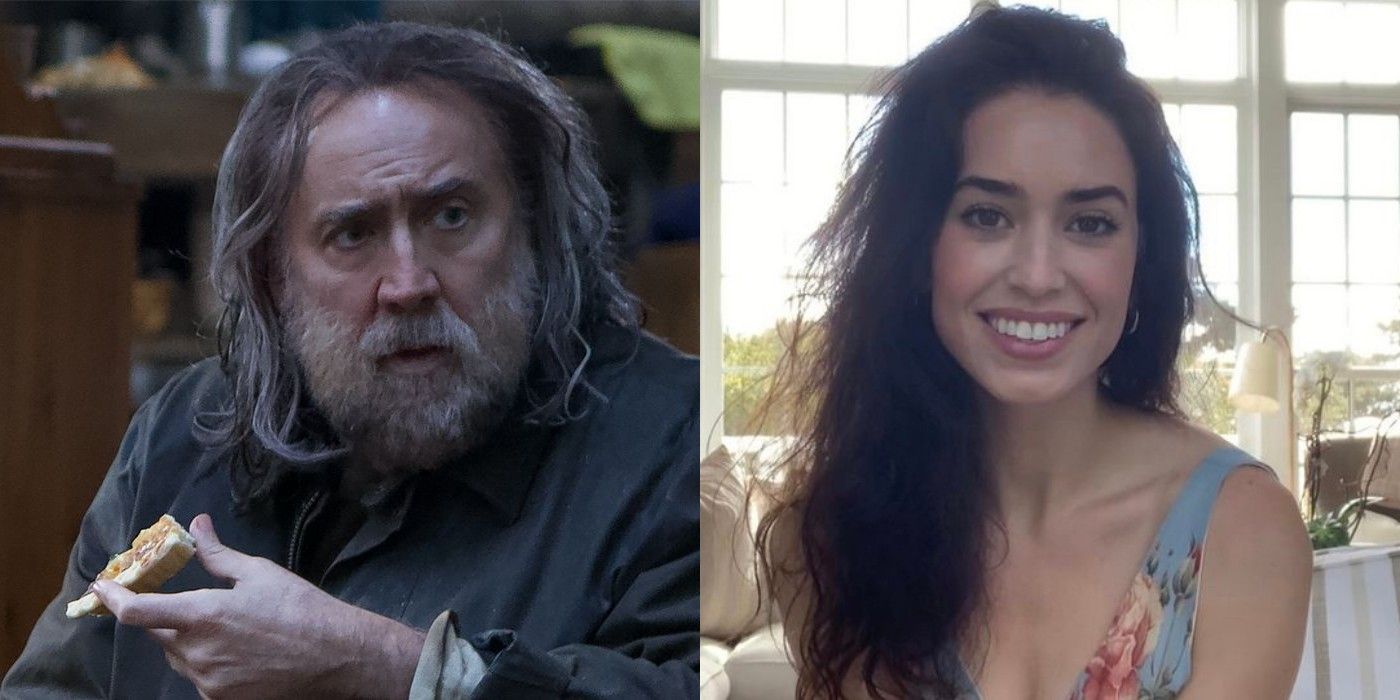
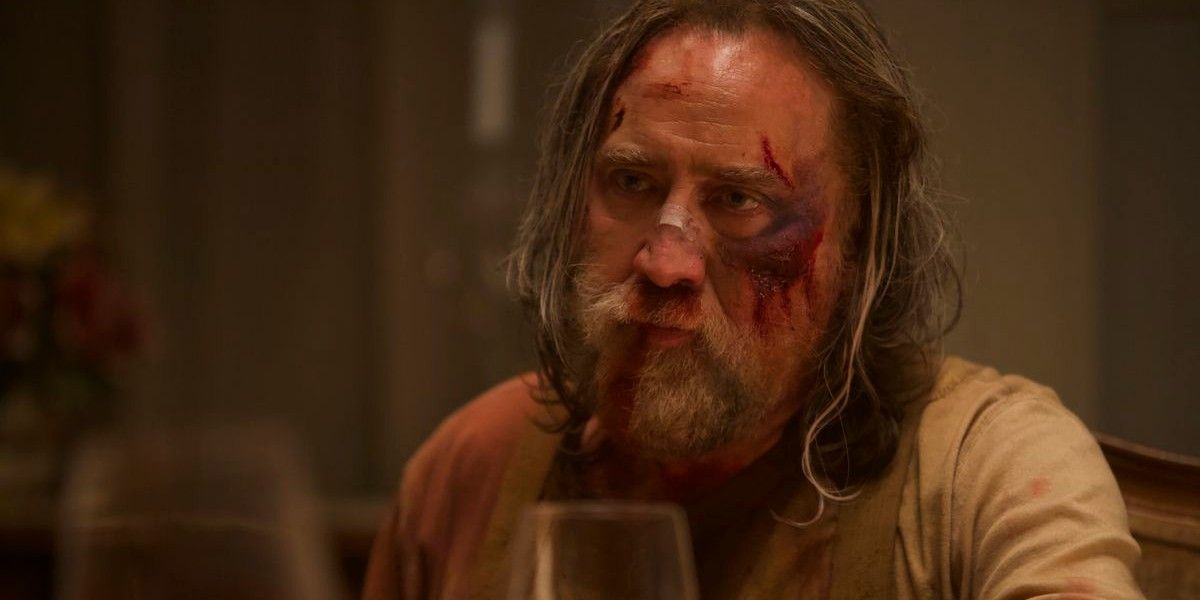
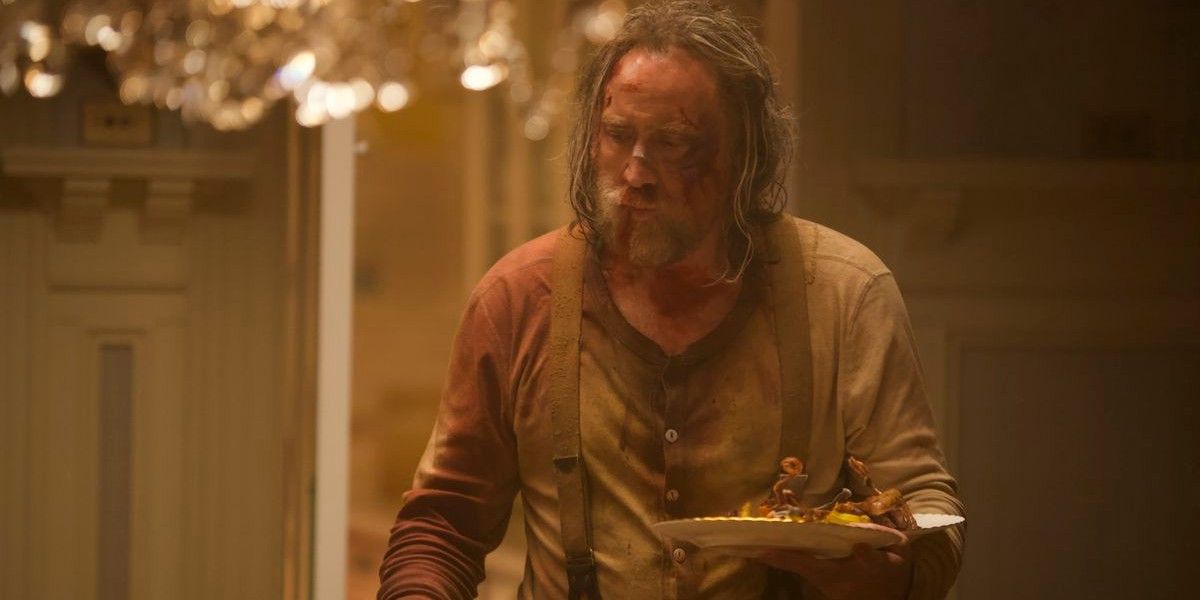
.jpg)
